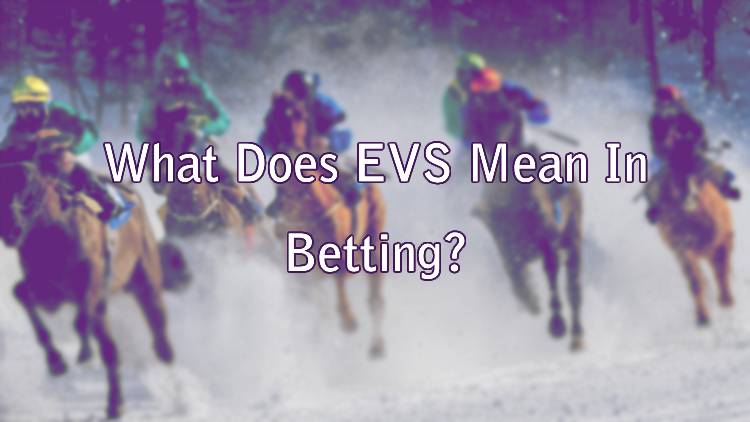
In the realm of sports betting, the term 'EVS' or 'evens' is frequently encountered. But, what exactly does it signify? Here at Wizard Slots, we aim to demystify the concept of EVS in betting and explain how it can potentially be beneficial to punters.
EVS, short for evens, is a term used in the world of betting to represent a particular set of odds offered by bookmakers. Simply put, when a bet is priced at evens, it suggests that for every unit you wager, you stand a chance to win an equivalent amount in return.
For instance, if you stake £50 on a football match at evens, and your team wins, your winnings would be £50, equalling the initial amount you staked. This means your total return would be £100, combining your original stake and the winnings.
However, it's crucial to understand that a bet priced at evens doesn’t necessarily mean there's an even 50/50 chance of the event occurring. It merely indicates the potential returns if your bet is successful.
EVS Meaning In Betting
EVS in betting is essentially a term used to denote a specific type of odds which is commonly referred to as 'even money'. Simply put, 'even money' implies that the potential amount you stand to win if your bet is successful is equal to the amount you have staked.
For instance, if you place a £10 bet at evens and your selection wins, you would receive £10 in winnings, plus your £10 stake, totalling a return of £20.
The term 'evens' may be displayed differently across various betting sites and regions. For example, in the decimal odds format which is popular in mainland Europe, 'evens' could be represented as '2.00'.
What Is An Evens Bet?
An evens bet is a type of wager where the potential profit is equivalent to the amount staked. This kind of bet is often viewed as advantageous due to its seemingly balanced ratio.
However, it's crucial to remember that an evens bet does not necessarily mean there’s a 50/50 chance of the bet being successful. Instead, it represents the payout structure if the bet does win.
The actual probability or likelihood of the event occurring could be less than 50%, depending on several factors including the bookmaker’s profit margin and the betting market dynamics.
EVS Odds In Decimal – Why?
While 'evens' is traditionally represented as '1/1' in fractional odds, it is often represented as '2.00' in decimal odds format. This format is commonly used in mainland Europe and is growing in popularity globally due to its simplicity.
In decimal odds format, 'evens' or '2.00' signifies that for every unit you stake, you stand to make two units in return if your bet is successful. This includes your original stake plus one unit of profit.
For example, if you place a £5 bet at odds of 2.00 and your selection wins, your return would be 2.00 x £5 = £10. This includes your original £5 stake plus £5 in profit.
Why Bet On Evens Bets?
Betting on evens may seem appealing. The potential returns can be attractive – typically double the amount staked, and the odds can often imply a roughly 50/50 chance of winning, potentially making them tempting propositions.
However, it's important to remember that the implied odds offered by the bookmaker may not align with the true odds of the event. The bookmaker’s odds often include a profit margin, meaning that the real chances of the outcome occurring could be less than 50%.
Despite these considerations, evens bets can be a valuable part of a punter's betting strategy, particularly when used in conjunction with thorough research and analysis of the betting market.
EVS Betting Example
Let's consider a practical example to better understand EVS betting.
Suppose you’re betting on a Premier League match between Manchester United and Chelsea. The bookmaker offers odds of 3/1 for a Manchester United win, 2/1 for a Chelsea win, and 'Evens' for a draw.
In this scenario, if you place a £20 bet on the draw at odds of 'Evens' and the match indeed ends in a draw, your potential winnings would be £20 (equal to your stake), and your total return would be £40 (your stake + winnings).
Is EVS The Same as EV In Betting?
No, EVS and EV in betting refer to different concepts. While EVS signifies 'even money' odds, EV stands for 'Expected Value' – a statistical concept used to determine the long-term profitability of a specific bet.
Expected Value (EV) measures the average expected gain or loss from each bet placed, based on the probability of different outcomes and the potential profits from each outcome.
In the world of sports betting, a positive expected value (+EV) signifies a profitable bet in the long run, while a negative expected value (-EV) implies a bet that would most likely result in a loss over time.
In conclusion, understanding the term 'EVS' and its implications in the betting world can be beneficial for both novice and experienced punters. It can provide useful insights into the potential returns on a bet and help bettors make more informed wagering decisions.
However, it's always crucial to remember that betting should be done responsibly, considering the inherent risks involved.
*All values (Bet Levels, Maximum Wins etc.) mentioned in relation to these games are subject to change at any time. Game features mentioned may not be available in some jurisdictions.
